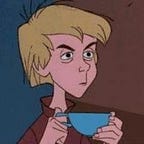Hitchcock: Master Of Mirth
Alfred Hitchcock was once quoted as saying: ‘Horror is the ugly Siamese twin of Comedy’. If he actually did say this is a different matter, but such a sentiment would not be entirely beyond the realm of belief given Mr. Hitchcock’s other, curious utterances. Whether he was suggesting a quick cut as the perfect cure for a sore throat, or a .38 slug (administered orally) as a sure-fire treatment of depression, even the most cursory study of Alfred Hitchcock’s public face reminds us that sir was a humorist.
To what degree, though, was Hitchcock a comedian? Was his humor sallowed by the gallows, or was his hangman tied up in knots? Perhaps only Vincent Price knows for sure, but neither he nor Hitchcock himself cares to step away from the party to discuss it.
Analyzing an artist’s work can be a fruitless task even when the subject is sitting down for an interview; never mind when he is thirty-five years dead and an avowed trickster. All we have of Hitchcock on Hitchcock is his work, his record, and his commentary, all of which are clouded over by the opacity of time, and warped by the man’s own proximity to the kingdom he had built. He was his work, and his work was his headline. Where Michael York can say, now, if he so chooses, that he regrets starring in Logan’s Run (heaven forfend), Hitchcock was never granted such an independence from his brand to speak plainly. The Hitchcock mill was turning until the day he died, and he had a responsibility to his workforce just as they had a responsibility to him. The man had an image to maintain. The question is: was it the image he had intended?
The best jokes are those which should have been obvious before the telling (what is the deal with airline food, anyway?). I contend that Alfred Hitchcock, while the master of suspense, was perhaps also a world class joker; his punch lines hiding in plain sight, on the silver screen, just like Hitchcock himself. Right there, coming out of the pet shop, see him? In another time, with a different scoring, the iconic Hitchcock scene would be nothing but comedy. Pigeons descend upon New England; a lady is chased from a bell tower by a nun; the goonish bellhop turns out to be a cross dresser (it was a different time)…and what is Lifeboat if not a bottle episode with a German in place of the mother-in-law? These are not jokes in themselves, but they could be, and that is perhaps the greatest joke of all. Alfred Hitchcock shook us to the core with a rubber chicken. He was a master twice.
It would be remiss of me to ignore Hitchcock’s actual comedy. I speak of Mr. & Mrs. Smith (1941, not 2005, naturally). Here, we have a genuinely funny domestic comedy about a couple who learn that a clerical error prevented their marriage from ever being official. They have to go through it again, though Mr. Smith had been recently questioning the marriage before this revelation, and Mrs. Smith starts seeing other men almost immediately. This is a comedy, remember; certainly not a tragedy. Just like how it’s comedy trying to find an answer to the age-old question of ‘what to do with that pesky corpse?’ (The Trouble With Harry, 1955). Comedy. I promise.
Ultimately, and genuinely, Hitchcock had a great sense of humor, and a mastery of intrigue. He was ambidextrous and bilingual (metaphorically speaking, though possibly literally also, but I can’t speak to that). He could turn anything to his whims whether it was making an awkward train conversation into suspense, or the unlawful disposal of human corpses into comedy. His vision was precise, his ear trained, and his command over a cast was legendary — at one point buying an actress’s love with a dog (Tallulah Bankhead, set of Lifeboat). The intention of the gift had been to honor her dedication despite the various hardships of production; the shape of the gift was a Sealyham terrier pup named ‘Hitchcock’. When asked why he had named the dog after himself, Hitchcock answered: “Ruff.” Then, Alfred Hitchcock answered: “It was the runt. We hadn’t expected it to survive. I do hope you enjoy it.”
Comedy. Pure comedy. He may not have been more master of comedy than suspense, but he definitely played them as two sides of the same coin. Or, two halves of the same twins, as it happens — and it does happen, more often than you might think.
I will leave you with these final words from the man himself:
“Drama is life with the dull bits cut out.”
That’s all.
Stay curious, Readers.
-G
